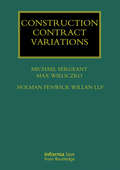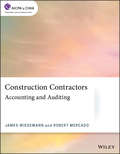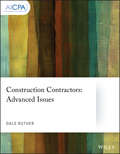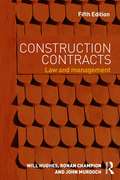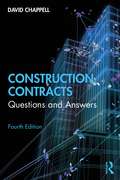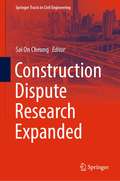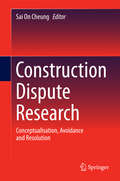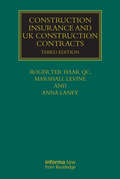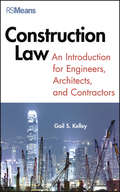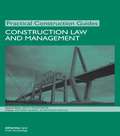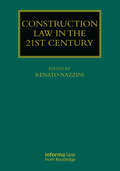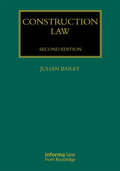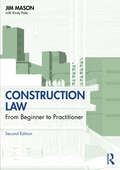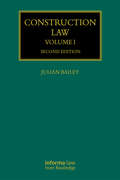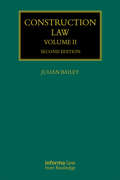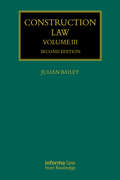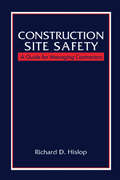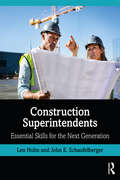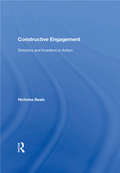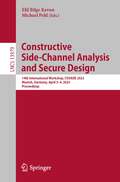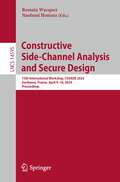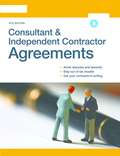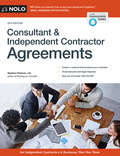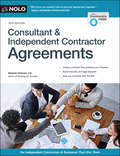- Table View
- List View
Construction Contract Variations: Construction Contract Variations (Construction Practice Series)
by Michael Sergeant Max WieliczkoChanges to the work on construction projects are a common cause of dispute. Such variations lead to thousands of claims in the UK every year and many more internationally. Liability for variations is not only relevant to claims for sums due for extra work but this is also an important underlying factor in many other construction disputes, such as delay, disruption, defects and project termination. This is the first book to deal exclusively with variations in construction contracts and provide the detailed and comprehensive coverage that it demands. Construction Contract Variations analyses the issues that arise in determining whether certain work is a variation, the contractor’s obligation to undertake such work as well as its right to be paid. It deals with the employer’s power to vary and the extent of its duties to approve changes. The book also analyses the role of the consultant in the process and the valuation of variations. It reviews these topics by reference to a range of construction contracts. This is an essential guide for practitioners and industry professionals who advise on these issues and have a role in managing, directing and compensating change. Participants in the construction industry will find this book an invaluable guide, as will specialists and students of construction law, project management and quantity surveying.
Construction Contractors: Accounting and Auditing (AICPA)
by James Wiedemann Robert MercadoWith construction activity increasing and significant changes to the revenue recognition model, it is more important than ever for accountants and financial managers to be on top of the very latest in accounting and auditing changes for the construction industry. This guide examines the most recent updates and key issues impacting construction accounting and auditing. It covers new changes as a result of FASB ASU 2014-09, it also explores the relationship between the contractor and the surety.
Construction Contractors: Advanced Issues
by Dale RutherConstruction Contractors: Advanced Issues by Dale Ruther
Construction Contracts: Law and Management
by Will Hughes Ronan Champion John MurdochThe fifth edition of this bestselling textbook has been thoroughly revised to provide the most up-to-date and comprehensive coverage of the legislation, administration and management of construction contracts. It now includes comparisons of working with JCT, NEC3, and FIDIC contracts throughout. Introducing this topic at the core of construction law and management, this book provides students with a one-stop reference on construction contracts. Significant new material covers: procurement tendering developments in dispute settlement commentary on all key legislation, case law and contract amendments In line with new thinking in construction management research, this authoritative guide is essential reading for every construction undergraduate and an extremely useful source of reference for practitioners.
Construction Contracts: Questions and Answers
by David ChappellThis fully revised and updated edition of Construction Contracts: Questions and Answers includes 300 questions and incorporates 42 new judicial decisions, the JCT 2016 updates and the RIBA Building Contracts and Professional Services Contracts 2018 updates. Construction professionals of all kinds frequently need legal advice that is straightforward as well as authoritative and legally rigorous. Building on the success of previous editions, David Chappell continues to provide answers to real-world FAQs from his experience as consultant and Specialist Advisor to the RIBA. Questions range in content from extensions of time, liquidated damages and loss and/or expense to issues of practical completion, defects, valuation, certificates and payment, architects’ instructions, adjudication and fees. Every question included has been asked of David Chappell during his career and his answers are authoritative but written as briefly and simply as possible. Legal language is avoided but legal cases are given to enable anyone interested to read more deeply into the reasoning behind the answers. This is not only a useful reference for architects, project managers, quantity surveyors and lawyers, but also a useful student resource to stimulate interesting discussions about real-world construction contract issues.
Construction Dispute Research Expanded (Springer Tracts in Civil Engineering)
by Sai On CheungAs an expansion of the book “Construction Dispute Research” published in 2014, this book presents further contributions and breaks into three new research foci in construction dispute studies. Part A discusses the conceptualization and minimization of biases in construction dispute decisions; Part B examines other impediments against settlement such as inequity, power asymmetry and loss aversion. Part C focuses on realty check of construction dispute negotiation conditions such as market competition, interdependence of contracting parties and dispute avoidance function of construction incentivization. This book showcases new ideas in construction dispute research. It offers research studies that are theory rich and conducted with robust methodologies. The research implications are practical and implementable.
Construction Dispute Research: Conceptualisation, Avoidance and Resolution
by Sai On CheungThere are three specific purposes of Construction Dispute Research. First, this volume aims to summarise studies on construction dispute. Second, apart from the theoretical constructs, where appropriate empirical tests are also included. This approach serves to go beyond the commonly used anecdotal approach for the subject matters. Third, it is the sincere hope of the authors that this book will help shaping research agenda of construction dispute The studies are mostly framed from a management perspective drawing on methods and concepts in contract law, economics, psychology and management science The book has twenty chapters that are arranged in four parts covering conceptualisation, avoidance, negotiation and mediation. Part 1 is devoted for dispute conceptualisation. A building is only as strong as its foundation. Thus it is no better start to study construction dispute by conceptualisation. The theme of Part 2 is dispute avoidance. The conventional wisdom of 'prevention is better than cure' seems can be applied to all problems. As far as construction dispute is concerned, equitable risk allocation and trust are the two most commonly accepted avoidance strategies. Part 3 focuses on negotiation that is the gateway to resolution as almost all disputes are negotiated first before the service of other mechanisms. Negotiation is sometimes described as an art because settlement may not be obtained solely from legal and rational approaches. Part 3 discusses the behavioral dimensions of construction dispute negotiation. Part 4 deals with Mediation- a form of assisted negotiation. Specially, the skill of the mediators in facilitating settlement, the interrelationships among dispute sources, mediator tactics and mediation outcomes are explored The studies presented in Construction Dispute Research collectively demonstrate holistic approach in dispute management. Each chapter can be read as a study on its own. Practitioners will find the book a handy reference in dispute management and resolution. Students would find the book useful in explaining in details the causes of dispute, the processes to resolve them. The research design and empirical approaches are particularly useful to students in construction management, architectural, surveying and civil engineering programs.
Construction Insurance and UK Construction Contracts (Construction Practice Series)
by Roger ter Haar Anna Laney Marshall LevineConstruction Insurance and UK Construction Contracts has long been the premier text for legal professionals looking for a combined analysis of construction contracts and their relation to insurance law. In a new and updated third edition, this book continues to provide in-depth commentary and pragmatic advice on all the most important regulations and policies surrounding contracts and insurance in the construction industry. Including brand new chapters on reinsurance and energy products, this book covers subjects such as: Minor, intermediate and major project construction contracts Classes of insurance contract The role of insurance brokers Risks in construction and legal liability Professional indemnity insurance and directors' and officers' liability insurance Bonds and insurance Latent defect insurance Property insurance Health and Safety and Construction Regulations Contract Insurance FIDIC, JCT and NEC 3 regulations PFI/PPP projects in the UK Dispute resolution This book is a vital reference tool and practical guide for lawyers and in-house counsels involved in the construction industry as well as project managers, quantity surveyors, construction contractors, architects and engineers needing advice from an experienced legal perspective.
Construction Law
by Gail S. KelleyFor a construction business to function properly, architects, engineers, and contractors need to understand how the various state and federal laws affect their business and how to avoid disputes and exposure to liability. This book offers a comprehensive review of the US legal environment, both criminal and civil, focusing on the key legal concepts and issues applicable to a typical construction project. Construction professionals will find clear, concise introduction to a wide range of contractual issues related to project participants, as well as issues related to the actual construction and litigation.
Construction Law and Management: Construction Law And Management (Practical Construction Guides)
by Keith PickavanceConstruction Law and Management explains the state of design information appropriate to a given procurement route, and the need to identify risks and strategies for managing them. This handy desk side reference offers a comprehensive guide to construction law and management and is essential reading for anyone in the construction, architecture and engineering industries.
Construction Law in the 21st Century (Construction Practice Series)
by Renato NazziniMarking the 35th anniversary of the Centre of Construction Law & Dispute Resolution at King’s College London, this volume brings together a large and illustrious group of contributors to create a comprehensive and authoritative guide cutting across all key areas of contemporary construction law, ranging from construction arbitration to procurement and contract law.It takes an international approach to construction law and considers issues such as investor-State dispute settlement, insolvency and liquidated damages in civil law and common law jurisdictions and procurement from a comparative perspective, as well as certain key common law/English law topics (such as fitness for purpose) that are of relevance to an international audience.The book provides detailed and practical guidance to the legal framework of the construction industry for barristers, solicitors, arbitrators, adjudicators, academics, contract managers, construction consultants and quantity surveyors, among others.
Construction Law: A Festschrift For Lord Justice Jackson (Construction Practice Series)
by Julian BaileyNow in its second edition, Construction Law is the standard work of reference for busy construction law practitioners, and it will support lawyers in their contentious and non-contentious practices worldwide. Published in three volumes, it is the most comprehensive text on this subject, and provides a unique and invaluable comparative, multi-jurisdictional approach. This book has been described by Lord Justice Jackson as a "tour de force", and by His Honour Humphrey LLoyd QC as "seminal" and "definitive". This new edition builds on that strong foundation and has been fully updated to include extensive references to very latest case law, as well as changes to statutes and regulations. The laws of Hong Kong and Singapore are also now covered in detail, in addition to those of England and Australia. Practitioners, as well as interested academics and post-graduate students, will all find this book to be an invaluable guide to the many facets of construction law.
Construction Law: From Beginner to Practitioner
by Jim MasonThis second edition of Construction Law: From Beginner to Practitioner provides a thorough and comprehensive guide to construction law by blending together black letter law and socio-legal approaches. This mixed methodology makes an ideal introduction to the subject for those studying to enter the architecture, engineering and construction (AEC) industry in a professional capacity. Designed to equip the student with all they need to know about construction law, the topics covered include: the fundamentals of law and the English legal system contract, business, tort and property law procurement, subcontracting and partnering claims, damages, losses and expenses dispute resolution including mediation, arbitration, litigation and adjudication The book's suitability for study is enhanced by its logical structure, chapter summaries and further reading lists whilst the role of law in achieving a more collaborative and less confrontational AEC industry is examined in detail. Fully updated throughout, this new edition includes coverage of post-Grenfell legislation; increased coverage of modern methods of construction and continuously evolving technologies such as BIM and digital twins; NEC4 and the latest JCT contract suite and the Construction Playbook. This book is useful not only for understanding the basics, but also as a reference that practitioners will use time and again.
Construction Law: Volume I (Construction Practice Series)
by Julian BaileyNow in its second edition, Construction Law is the standard work of reference for busy construction law practitioners, and it will support lawyers in their contentious and non-contentious practices worldwide. Published in three volumes, it is the most comprehensive text on this subject, and provides a unique and invaluable comparative, multi-jurisdictional approach. This book has been described by Lord Justice Jackson as a "tour de force", and by His Honour Humphrey LLoyd QC as "seminal" and "definitive". This new edition builds on that strong foundation and has been fully updated to include extensive references to very latest case law, as well as changes to statutes and regulations. The laws of Hong Kong and Singapore are also now covered in detail, in addition to those of England and Australia. Practitioners, as well as interested academics and post-graduate students, will all find this book to be an invaluable guide to the many facets of construction law.
Construction Law: Volume II (Construction Practice Series)
by Julian BaileyNow in its second edition, Construction Law is the standard work of reference for busy construction law practitioners, and it will support lawyers in their contentious and non-contentious practices worldwide. Published in three volumes, it is the most comprehensive text on this subject, and provides a unique and invaluable comparative, multi-jurisdictional approach. This book has been described by Lord Justice Jackson as a "tour de force", and by His Honour Humphrey LLoyd QC as "seminal" and "definitive". This new edition builds on that strong foundation and has been fully updated to include extensive references to very latest case law, as well as changes to statutes and regulations. The laws of Hong Kong and Singapore are also now covered in detail, in addition to those of England and Australia. Practitioners, as well as interested academics and post-graduate students, will all find this book to be an invaluable guide to the many facets of construction law.
Construction Law: Volume III (Construction Practice Series)
by Julian BaileyNow in its second edition, Construction Law is the standard work of reference for busy construction law practitioners, and it will support lawyers in their contentious and non-contentious practices worldwide. Published in three volumes, it is the most comprehensive text on this subject, and provides a unique and invaluable comparative, multi-jurisdictional approach. This book has been described by Lord Justice Jackson as a "tour de force", and by His Honour Humphrey LLoyd QC as "seminal" and "definitive". This new edition builds on that strong foundation and has been fully updated to include extensive references to very latest case law, as well as changes to statutes and regulations. The laws of Hong Kong and Singapore are also now covered in detail, in addition to those of England and Australia. Practitioners, as well as interested academics and post-graduate students, will all find this book to be an invaluable guide to the many facets of construction law.
Construction Site Safety: A Guide for Managing Contractors
by Richard D. HislopAn important part of an organization's overall safety and health program involves safety management for contractors. A contractor with a poor safety program can adversely affect quality, productivity, schedules, and overall cost. This book explains how to manage project safety and improve the odds of an injury-free workplace.If project mana
Construction Superintendents: Essential Skills for the Next Generation
by John E. Schaufelberger Len HolmConstruction Superintendents: Essential Skills for the Next Generation is the first college-level textbook designed to prepare you to take on a site supervisor role on a complex jobsite. The book covers the responsibilities of superintendents in relation to the jobsite project management team, the project owners, designers, and municipal services. The book outlines the development of the superintendent and his or her role and responsibilities in twenty-first century construction projects. Using examples and case studies of cutting-edge jobsite practices from the use of computer applications to leadership and capital development, this book lays out all the functions of a modern site superintendent in an easy-to-understand format. The book includes: coverage of the full spectrum of tasks and skills required from the pre-construction phase, through start-up, operation and close-out, plus advanced topics for those serious about leading the field real-world case studies, forms, and documentation stored on a companion website chapter summaries, review questions, and exercises to aid both teaching and learning. This book fills in the long-standing need for an academic textbook designed as an applied instructional resource suitable for university and college students enrolled in construction management and construction engineering programmes.
Constructive Engagement: Directors and Investors in Action
by Nicholas BealeThe relationships between investors, directors and companies have never been so vital, or so confusing. Gone are the days when being a non-executive director (NED) meant an agreeable lunch and when CEOs wanted them to meet investors 'over my dead body'. Even the most admired companies can be engulfed in scandal and the NEDs find themselves having to drive through fundamental changes. The corporate environment is full of pitfalls for unwary boards. And there are plenty of headline stories of directors who have failed to measure up. Equally, a high quality board which has the confidence of the investors is a major strategic asset: making better decisions, attracting better people and allowing bolder strategies to succeed with investor backing. Nicholas Beale uses research gathered from leading FTSE 100 chairmen, directors, non-executive directors and investors to explore their changing roles. What emerges is a fascinating and instructive picture of constructive engagement; an approach that sees these companies (and the people behind them), each in their own way, address the challenges that are at the heart of global capitalism, and that have lead to the Higgs Review, Sarbanes-Oxley and other regulatory attempts to address corporate mismanagement. From discussions with over 100 leading practitioners, detailed studies of three leading companies, three leading investors and an extended case study on investor engagement at Royal Dutch Shell, the author draws a series of ideas and guidance for all of the parties involved. Sadly this book has come too late for the directors and investors of those companies that have crashed and burned, but all others who are, or aspire to be, directors or significant investors in listed companies should read this book, learn the lessons it has to offer and start adopting them in the organization(s) with which you work and in the portfolios you develop. For more information visit www.conseng.net
Constructive Side-Channel Analysis and Secure Design: 14th International Workshop, COSADE 2023, Munich, Germany, April 3–4, 2023, Proceedings (Lecture Notes in Computer Science #13979)
by Elif Bilge Kavun Michael PehlThis book constitutes the refereed proceedings of the 14th International Workshop on Constructive Side-Channel Analysis and Secure Design, COSADE 2023, held in Munich, Germany, during April 3–4, 2023. The 12 full papers included in this book were carefully reviewed and selected from 28 submissions. They were organized in topical sections as follows: fault-injection analyses and countermeasures; side-channel analyses and countermeasures; attacks on PQC and countermeasure; and analyses and tools.
Constructive Side-Channel Analysis and Secure Design: 15th International Workshop, COSADE 2024, Gardanne, France, April 9–10, 2024, Proceedings (Lecture Notes in Computer Science #14595)
by Romain WacquezThis book constitutes the refereed proceedings of the 15th International Workshop on Constructive Side-Channel Analysis and Secure Design, COSADE 2024, held in Gardanne, France, during April 9–10, 2024. The 14 full papers included in this book were carefully reviewed and selected from 42 submissions. They were organized in topical sections as follows: Analyses and Tools; Attack Methods; Deep-Learning-Based Side-Channel Attacks; PUF/RNG; and Cryptographic Implementations.
Constructivism in Ethics
by Carla BagnoliAre there such things as moral truths? How do we know what we should do? And does it matter? Constructivism states that moral truths are neither invented nor discovered, but rather are constructed by rational agents in order to solve practical problems. While constructivism has become the focus of many philosophical debates in normative ethics, meta-ethics and action theory, its importance is still to be fully appreciated. These new essays written by leading scholars define and assess this new approach in ethics, addressing such questions as the nature of constructivism, how constructivism improves our understanding of moral obligations, how it accounts for the development of normative practices, whether moral truths change over time, and many other topics. The volume will be valuable for advanced students and scholars of ethics and all who are interested in questions about the foundation of morality.
Consultant & Independent Contractor Agreements
by Stephen FishmanDesigned for both independent contractors and the businesses who hire them, Consultant & Independent Contractor Agreements is the most comprehensive guide you'll find anywhere. The book shows you how to: define a project's scope, components, and duration protect trade secrets, trademarks, patents, and copyrights satisfy IRS requirements get paid on time and in full avoid disputes The new edition is completely updated to provide the latest rules and regulations for businesses and contractors. It includes step-by-step guidance and all the forms you'll need to draw up the necessary contracts.
Consultant & Independent Contractor Agreements
by Stephen FishmanDesigned for both independent contractors and the businesses who hire them, Consultant & Independent Contractor Agreements is the most comprehensive guide you’ll find anywhere. The book shows you how to: define the scope and duration of the work to be performed protect trade secrets, trademarks, patents, and copyrights satisfy IRS and other government agency requirements establish pay and other compensation avoid disputes. The new edition is completely updated to provide the latest rules and regulations for businesses and contractors. It includes step-by-step guidance and all the forms you'll need to draw up the necessary contracts.
Consultant & Independent Contractor Agreements
by Stephen FishmanGet your contract in writing With the rise of the gig economy, independent contractor arrangements are more common than ever. Whether you’re an independent contractor or a business hiring one to work for you, a written agreement will help to protect your rights, define expectations, and prove that there’s no employer-employee relationship. Here you’ll find specific agreements for many types of independent contractors and freelancers, including salespeople, accountants, software consultants, and construction contractors. You’ll learn how to: draft a binding agreement define a project’s scope preserve confidentiality distinguish between employees and independent contractors protect your intellectual property amend your agreement, and satisfy IRS requirements. Each chapter has two agreements—one geared towards the independent contractor and one geared towards the business hiring an independent contractor. The 10th edition—completely updated to provide the latest rules and regulations—includes a useful chapter on agreements for gig workers. With downloadable forms: download all the forms you need to draw up a solid contract (details inside).
